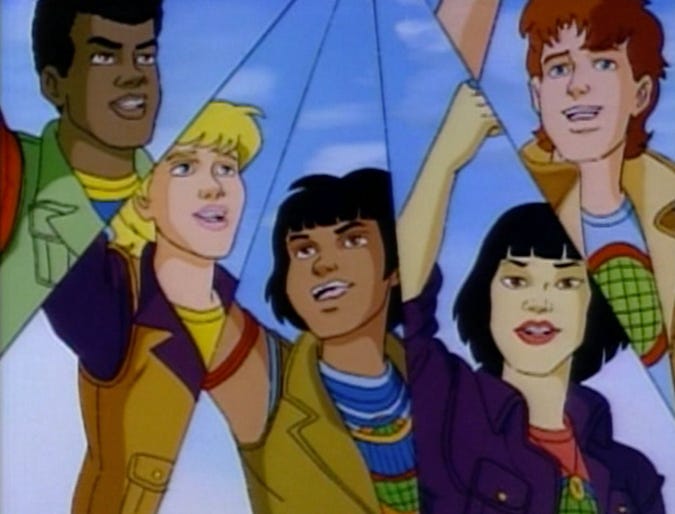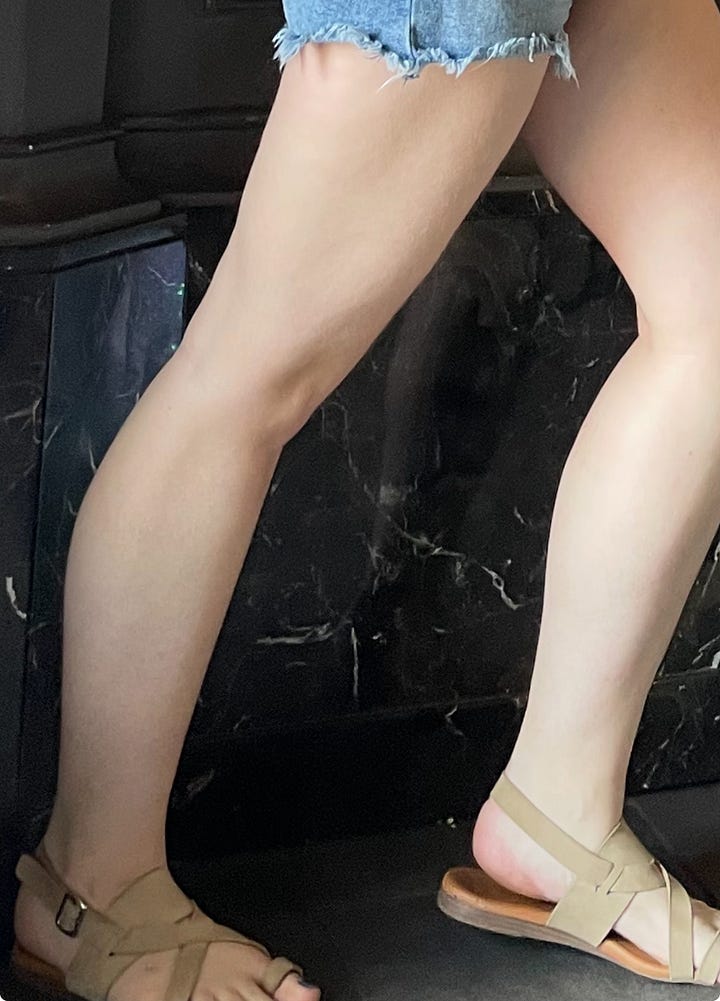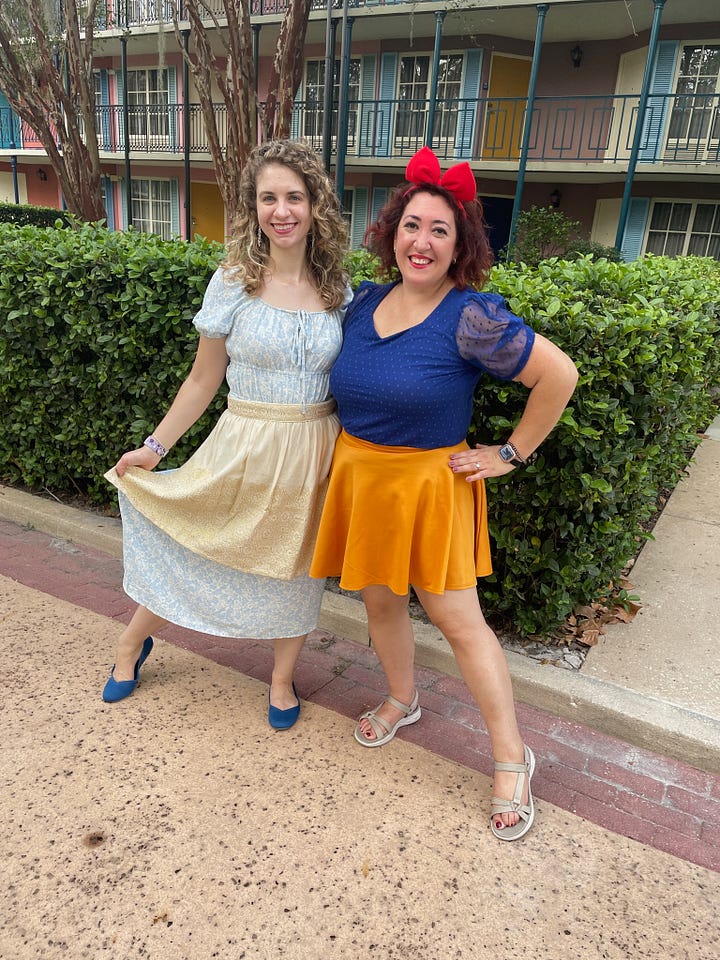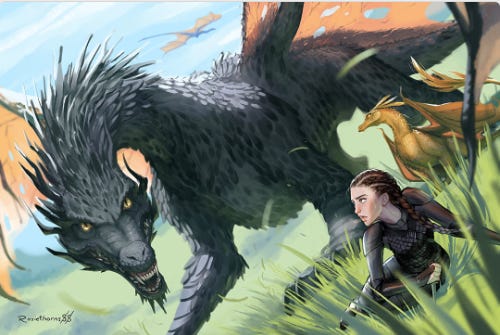On Disability Representation in Fantasy and my EDS literary twin
If you have managed to make it this far in life without hearing about Fourth Wing, oh how I envy you. I’m not even *on* TikTok and I still know about this book.
I wasn’t going to read this book because I heard…mixed things about it. But then a friend (hi Emilie!) mentioned that she thought the main character had EDS, and well, now I had to read it. After months (and I do mean months) of having it on hold at the library, it finally came in. Even though it’s a hefty one, I devoured it quickly because who *doesn’t* want to read about enemies to lovers romance and hot people fighting on dragons? We have so little, let me have this.
Anyways, the key thing here is the EDS. Violet, our main character, has what has been canonically confirmed by the author herself as EDS. This was my intrigue: mainly because I also have EDS and have spent the past year on a journey to get myself diagnosed. Seeing EDS in real life is rare enough, but having disability representation in literature? For a rare disease? In a best selling book? I had to get in on this.
Now, before we go anywhere and we chat about dragons and hot angsty men and disability representation, I have to give you some background.
On EDS
EDS is the abbreviation for Ehler-Danlos Syndrome, a collection of 13 heritable diseases. They are largely grouped into 3 subtypes - the vascular type, the classic type, and the hypermobile type. I have hypermobile EDS, and I would self categorize as saying I have a milder form of it. Meaning: I made it until my mid-20s before anyone suspected that anything was wrong with me, and then until 32 before I got an official diagnosis.1
EDS is marked by lots of things, especially because it’s a very broad disease group, but it comes down to collagen. My body doesn’t produce enough collagen, and it’s not all in the right places. If you’ve ever seen me hyperextend my elbows, congrats, that’s my EDS.
Now I don’t want you immediately panicking that you, too, have a heritable genetic disease. You probably don’t. Hypermobile joints are pretty common. What isn’t common is what else I have going on: unstable joints. Easily bruising skin. Sprains and rolling joints up the wazoo. Skin that heals slowly. I have a few Marfan Syndrome markers - namely how my fingers move and a high palette. I’ve also got super soft stretchy skin, flat feet, and a real bad eye Rx. So unless you’ve got all this going on? Take a deep breath. You’re probably fine.2

And not only that - but my doctors agreed with me. My chiropractor noted that I had extreme mobility in my lower back, which is not a place that one is typical super mobile. My primary agreed. So when I went to get referrals to a rheumatologist and a geneticist, I had medical professionals backing me up. Heck, it was a DOCTOR who first asked me if I had EDS.
Please don’t worry - I’m fine. There’s not really much that can be done, because it’s not like doctors or scientists can just…figure out where my body isn’t producing collage and put more collagen there. I luckily do not have a concerning family history (no collapsed lungs or aortic dissections or fun things like that), and my genetic results look (fairly) clean.3 I have a diagnosis, and have a care plan to maintain my health going forward. But boy, was it a relief to finally know.
DID YOU KNOW - you are not supposed to feel your body at all times? That there is an option of having a 0 on the pain scale??? Yeah, this was news to me. I feel my body all the time. All. The. Time. Just sitting here? Writing this? I can feel my knees and my elbows and my right shoulder, which is cramping. They don’t hurt like shooting pain hurt, but they’re there. It’s like a 1-2 on the pain scale, a solid ache. And that is constant. Some days it’s worse than others (hi any low pressure weather system) and I cannot do anything involving jumping any more because my knees hate it. But I’m still able to do what I love for the most part, and I’m working to preserve my joints so I don’t get arthritis.

All this to say - I am an authority on EDS. Specifically my own case, but I know enough that I can be relied upon to give a solid review of this book’s portrayal. Remarkably, the EDS website is VERY informative.4 I am happy to answer any questions you may have, or discuss my own diagnosis journey. It’ll probably get written about at some point, but since I’m still in the thick of it, I need some time to process.
Here are some pictures of me, subluxing my joints on various Disney trips.




Anyways, enough about me and my wibbly wobbly joints. Now onto the dragons and hot angsty men.
On My Actual Reaction
Warning: Spoilers
So, what are my thoughts overall? On the one hand - I think it’s a very realistic portrayal of EDS. EDS is a complex and varied condition, and while Violet’s experience does not mirror my own, I was able to recognize it without it ever being named: the bruising, easily breaking bones, dislocating joints, muscle weakness and general physical instability. I did also relate to the reactions that people around Violet had - either dismissing her for being weak, or assuming she’d get on with life while ignoring that her body has other needs.
The great thing about fantasy is that you can drop a real world disease like EDS into the world, and since it’s fantasy and everything is made up anyways, it’s not that unrealistic. It’s a great way to include representation without having to create a whole new disease or disability. It’s a made up world; anything goes.

However, I did think Violet was othered throughout the entire book. I understand that this is part of the plot - she’s a differently abled person in an environment where no one else shares her issues. I’m sure that’s realistic, but again: this is fantasy. You as the author can do whatever you want. So if you are choosing to other your main character because of their disability, then that is still a choice.
The dragon riders are supposed to be physically tough. Ok, sure! Violet gets along by using her speed and agility to her advantage, and outsmarting everyone else. She makes up for what she lacks in physical strength with ingenuity. Great, I’m onboard. But you’re telling me that no one else in the 600 years this country has been around has thought to outsmart everyone to become a dragon rider? No one else has thought of this??? We’re getting into super special main character territory here - especially with Violet now being the only person ever to bond to two dragons - and that’s when I started to feel uncomfortable. Even if Violet is the only one in her year to have a disability, she appears to be THE ONLY person in this entire book with a notable disability.5 LGBTQ representation was integrated seamlessly into the plot, and I was hoping disability representation would be, too.
On top of that - none of the surviving dragon riders have any sort of disability. If we’re to believe that being a dragon rider is as physically difficult and dangerous as it seems, where are the people who have lost eyes? Or lost arms? Or legs? The only real physical ailment we see is scars. Again, sure. But if you want me to believe that we’re not in the ‘Disability as a Superpower Trope’ land, and that Violet is not ‘the most super special ever because she’s ~not like other dragon riders~’ then I needed more examples of other characters who had physical limitations. The book was walking a fine line, and maybe this othering that I mentioned will get better in the planned sequels. This is not just something that Fourth Wing struggles with, though. Many disability representations in popular media fall into this trap. If you’re looking for more examples and information on the ‘Disability as a Superpower Trope,’ Jessica Kellgren-Fozard has a wonderful video on it that I’ll include below.
The end result is that even though Violet’s disability is a central part of the plot and her life, she stands out as being ‘different,’ which is the opposite of good disability representation. The point of disability representation is that we *aren’t* unique. I don’t look like I have a disability, and many other people don’t, either. Calling Violet out as special, even when she has a well documented disability, misses the entire point. (At least for me.)
I don’t blame Rebecca Yarros too much here, as I know she herself suffers from EDS. Violet’s experiences could entirely mirror her own. I don’t know - and I’m not about to judge her for that. This was merely my reaction as a fellow EDS sufferer. There’s a sequel that I haven’t read yet, so who knows if some of these issues are rectified there. This was just my reaction as someone who can relate to the main character in more ways than I ever thought possible. I don’t have a dragon, but I *do* have unstable joints.

Why does this matter, anyways? Disability representation is important - both in literature and in the wider world of media. Being disabled is the only signifier that a person can become in their lives. This is a generalization, but most of our determined characteristics are fixed. You can become disabled at any time. Just because you aren’t born with a disability is not a guarantee that you will not incur one later. As a society,6 we tend to ignore this. We demonize disabled people for not keeping up with the pace that a capitalist society sets, and for ‘demanding’ accommodations. This isn’t just wrong, it’s also stupid, frankly. We do not give people access to the information they need to understand disabilities, and how they can manage them. One way to do this can be through media. Having characters like Violet who exist is a great way to spread awareness about disabilities, especially ones that readers may be unfamiliar with.

I don’t speak for every disabled person, obviously, but most disabled folks are out here just living their lives. We don’t want parades, but we do want to be treated with respect and not assumed to have superpowers just because we make it through the day. I’m still not even sure how I feel about calling myself disabled, even though its true,7 which just goes to show you how pervasive this thinking is. I am a fairly high functioning person, abut my entire EDS journey was exhausting for *me,* someone who can pantomime as a good little capitalist worker on the best of days. On the one hand, I’m proud of everything I’ve accomplished. On the other, I’d like for it to not be so hard. There was a big storm last night, and I woke up around 3am with all of my joints throbbing. There went my good night sleep, but capitalism doesn’t care about that! I still have to get up and go to work.
I did enjoy Fourth Wing, though. Truly! It was a nice escape from the drudgery of reality, and the pace was excellent. It was eminently readable and by this I mean - I felt sucked in and kept wanting to get back to reading it when I had to do other adult things like working. Do I wish I had a dragon and hot brooding men lusting after me? Obviously. I’m not an idiot; just a gal with unstable joints.
Outside of the EDS specific parts, this book was basically no plot, no thoughts, just vibes. Honestly? I was down for it. A seat mate on a train once described romance novels as her ‘brain candy.’ I read enough ‘serious’ books. This was my brain candy. Do I think the author is going to have issues building out a believable world in 4 more books that weren’t already planned? Yup. Am I still going to read them? Oh you betcha. If nothing else, just to read about hot people fighting each other and dragons. I’m a simple gal at heart.
Have you read Fourth Wing? Did you, too, get sucked into the fantasy dragon world? Let me know in the comments!
Which was just about 2 months ago, btw.
There’s more, too - many EDS sufferers easily break bones and dislocate their joints. That hasn’t been my particular experience, but just to add some extra commentary.
But that’s a whole other story.
https://www.ehlers-danlos.com/
If I’m wrong please call me out on this but I don’t recall anyone else being disabled in the way Violet was, other than a few characters having scars and being old. There was one character who I believe was deaf, but I couldn’t tell from the text if she was deaf or if it was just the stipulations of where she worked in The Archives.
And here I’m speaking about the US specifically.
I learned in 2021 on a job application that the anxiety I’ve had my whole life is considered a disability. That was news to me. Opa!




